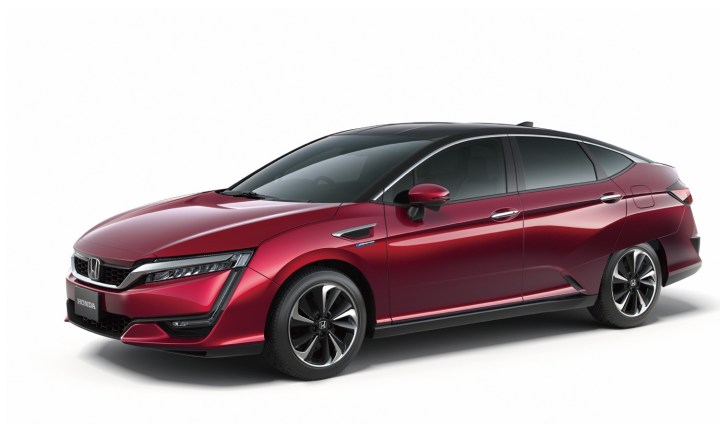
Picking up where the old FCX Clarity left off, the Honda FCV will represent fully-realized hydrogen fuel-cell tech although, like the Hyundai Tucson Fuel Cell and Toyota Mirai, it may only be available in limited numbers at first. It also won’t be called FCV when it reaches showrooms; Honda is saving the actual name for the car’s Tokyo debut.
The production model maintains some design elements from the previous FCEV and FCV concepts, blended with enough styling cues from models like the 2016 Civic and Accord to give the car a Honda family look. It’s perhaps a bit more conservative than the Toyota Mirai, but still distinctive enough to explicitly advertise its fuel-cell powertrain.
The FCV will have seating for five, and Honda says the powertrain components are compact enough that everything fits under the hood. Honda expects a range of around 700 kilometers (434 miles) per tank, although that may decrease a bit when measured on the U.S. EPA testing cycle. The carmaker also promises “exhilarating driving” thanks to “high-output motors.”
In Japan, at least, the FCV will also have a useful party trick. Honda says it will be able to provide emergency backup power to homes during power outages. This technology has received a lot of attention in Japan in the wake of the 2011 tsunami and the Fukushima nuclear disaster. We’ll have to wait and see if the feature is offered in the U.S.
Honda previously said that the FCV will go on sale in Japan in March 2016, and hit U.S. shores sometime after that. It’s possible that the car will only be offered in California, the only state that currently has the fueling infrastructure to support a fleet of hydrogen cars.
Editors' Recommendations
- All the hydrogen vehicles available for purchase
- Geneva Motor Show canceled due to coronavirus outbreak
- Hyundai’s hydrogen fuel cell truck makes hauling freight green and glamorous
- Nissan unveils its next-gen technology, including a virtual reality passenger
- Honda’s new hybrid Fit is here, but will it jazz up the firm’s American range?


